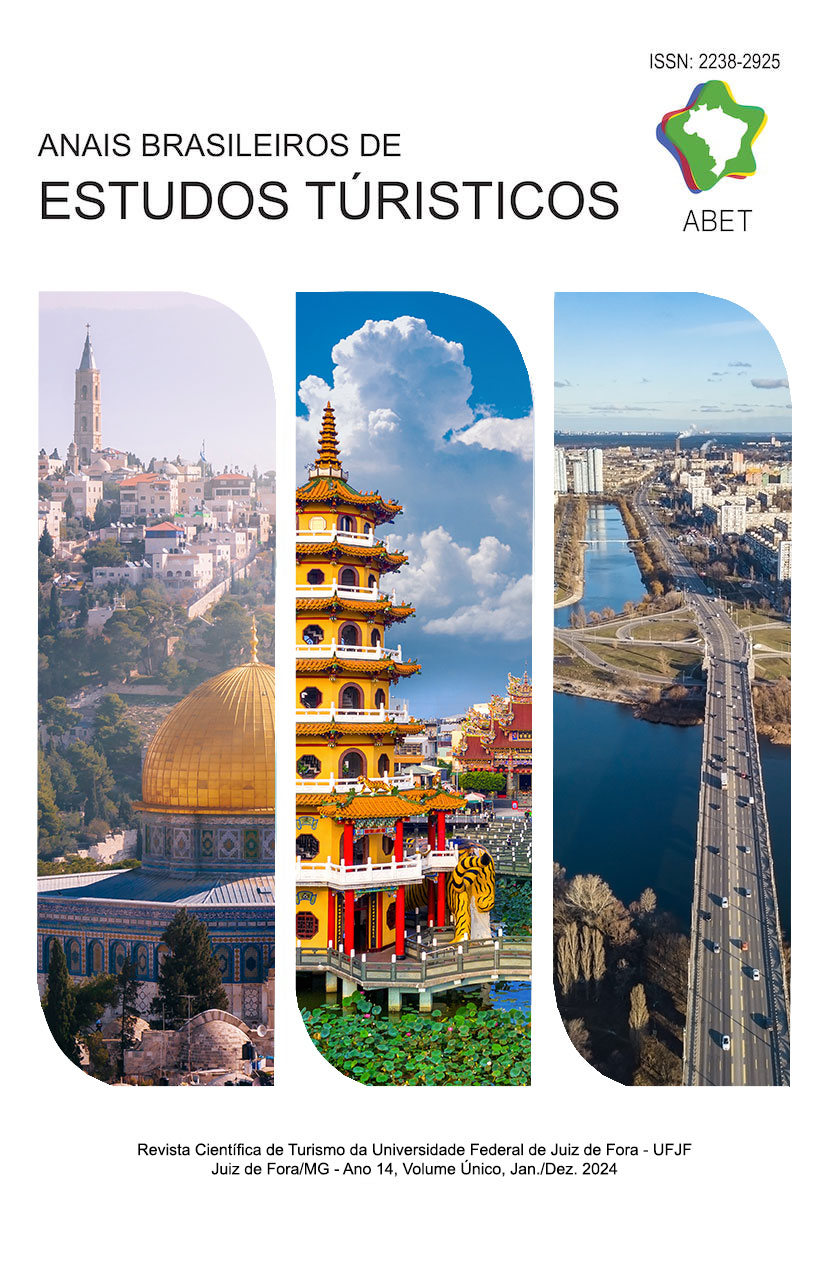Geopolitics of the geopolitics of tourism: a Latin American tradition?
DOI:
https://doi.org/10.5281/zenodo.14579370Keywords:
Tourism, World System, Geopolitics, Critical GeopoliticsAbstract
Recognizing that tourism has evolved into a global activity, its economic importance—stemming from its integration and expansion within the capitalist system—alongside its social significance (as a mechanism for conflict stabilization, social classification, and hierarchy), cultural role (as adherence to values, affirmation of belonging, and secularized rituals), and political function (as an ideological means of promoting a type of integration of peripheral societies into the world system) have progressively increased in contemporary society, particularly in the post-World War II context. This theoretical essay maps, through an unsystematic and narrative review, the main analytical approaches to the geopolitics of tourism in the first two decades of the 20th century, aiming to identify their key characteristics, components, central ideas, and authors, as well as their theoretical developments (schools of thought). Despite the recent increase in studies on the geopolitics of tourism, this subfield remains fragmented at the international level. This paper argues for the existence of an autonomous Latin American tradition dating back to the 1970s, whose continuity, persistence, and renewal (through the training of new generations) can be characterized as a school, albeit one whose dissemination is relatively limited by linguistic barriers. Finally, the essay proposes a research agenda aimed at recovering this autonomous tradition, updating it, and eventually engaging it in dialogue with theories, concepts, and frameworks from other paradigmatic traditions, in order to advance studies in this field.
Downloads
References
Agnew, John (2003[1998]). Geopolitics: re-visioning world politics. Taylor & Francis e-Library [Routldge]: London & New York.
Arnaiz Burne & César Dachary (2004). Sustentabilidad, Pobreza y Turismo: ¿oportunidad o necesidad? Estudios y Perspectivas en Turismo, (documentos especiales), v.13, pp.160-173.
Arnaiz Burne, S. M. & César Dachary, A. A. (2009). Geopolítica, recursos naturales y turismo: una historia del Caribe mexicano. Editora de la Universidad de Guadalajara, Centro Universitario de la Costa.
Bhandari, Kalyan. (2019). Tourism and the geopolitics of Buddhist heritage in Nepal. Annals of Tourism Research, Volume 75, pp. 58-69, ISSN 0160-7383, https://doi.org/10.1016/j.annals.2018.12.006.http://www.sciencedirect.com/science/article/pii/S0160738318301361)
Bianchi, Raoul. (2018). The political economy of tourism development: A critical review. Annals of Tourism Research, Volume 70, pp.88-102, ISSN 0160-7383, https://doi.org/10.1016/j.annals.2017.08.005. (http://www.sciencedirect.com/science/article/pii/S0160738317301287)
Brauer, Rene; Dymitrow, Mirek & Tribe, John. (2019). The impact of tourism research. Annals of Tourism Research, Volume 77, pp.64-78, ISSN 0160-7383, https://doi.org/10.1016/j.annals.2019.05.006.(http://www.sciencedirect.com/science/article/pii/S0160738319300805)
Cerdas, S. N. (2014). Geopolítica en una “periferia del placer”. Colonialidad turística en Costa Rica. Rev. Ciencias Sociales 145(III): pp.45-60. https://revistas.ucr.ac.cr/index.php/sociales/article/view/17610
César Dachary, A.; César Arnaiz, F.; Arnaiz Burne, S. M. (2016). Capitalismo, sociedad y turismo. Opción, v. 32, Especial n.13, pp.319-338.
César Dachary, A., & Arnaiz Burne, S. (2013). El turismo y la sociedad de consumo. Turismo y Sociedad, 14, 65-82. Recuperado a partir de https://revistas.uexternado.edu.co/index.php/tursoc/article/view/3715
César Dachary, A., & Arnaiz Burne, S. (2014). El caribe mexicano: La construcción de una frontera. Boletín Geográfico, 0(26), pág.61-74. Recuperado de http://revele.uncoma.edu.ar/htdoc/revele/index.php/geografia/article/view/236
César Dachary, A., & Arnaiz, S. M. (2012). Región fronteriza de Argentina y Brasil: asimetrías y potencialidades. DRd - Desenvolvimento Regional Em Debate, 2(1), 204-231. https://doi.org/10.24302/drd.v2i1.203
Dodds, Klaus; Kuus, Merje & Sharp, Joanne (2013). Introduction: geopolitics and its critics. In: Dodds, Klaus; Kuus, Merje & Sharp, Joanne (2013). The Ashgate Research Companion to Critical Geopolitics. Eds. Farnham, UK: Ashgate. (1rst Ed.). [Print ISBN: 9781409423805] DOI 10.4324/9781315612874
Gao, Jun; Ryan, Chris; Cave, Jenny & Zhang, Chaozhi. (2019). Tourism border-making: A political economy of China's border tourism. Annals of Tourism Research, Volume 76, pp.1-13, ISSN 0160-7383, https://doi.org/10.1016/j.annals.2019.02.010.(http://www.sciencedirect.com/science/article/pii/S0160738319300258)
Gillen, Jamie & Mostafanezhad, Mary (2019). Geopolitical encounters of tourism: A conceptual approach. Annals of Tourism Research, Volume 75, pp. 70-78, ISSN 0160-7383,https://doi.org/10.1016/j.annals.2018.12.015.(http://www.sciencedirect.com/science/article/pii/S0160738318301452)
Gyan P. Nyaupane, Dallen J. Timothy, (2010). Power, regionalism and tourism policy in Bhutan. Annals of Tourism Research. Volume 37, Issue 4, pp.969-988, ISSN 0160-7383, https://doi.org/10.1016/j.annals.2010.03.006.(http://www.sciencedirect.com/science/article/pii/S016073831000037X)
Kim, Seongseop (Sam), Prideaux, Bruce & Timothy, Dallen (2016). Factors affecting bilateral Chinese and Japanese travel. Annals of Tourism Research, Volume 61, pp.80-95, ISSN 0160-7383, https://doi.org/10.1016/j.annals.2016.08.001.(http://www.sciencedirect.com/science/article/pii/S0160738316301153).
Lacoste, Y. (2004). Pour une approche géopolitique de la diffusion de l’anglais. Hérodote, (4), 5-9.
Lacoste, Yves (Org.). A Geopolítica Do Inglês. São Paulo: Parábola, 2005. 159p.
Raento, Pauliina. (2009). Tourism, nation, and the postage stamp: Examples from Finland. Annals of Tourism Research, Volume 36, Issue 1, pp. 124-148. ISSN 0160-7383, https://doi.org/10.1016/j.annals.2008.10.006.(http://www.sciencedirect.com/science/article/pii/S0160738308001175)
Rowen, Ian. (2014). Tourism as a territorial strategy: The case of China and Taiwan. Annals of Tourism Research, Volume 46, pp. 62-74, ISSN 0160-7383, https://doi.org/10.1016/j.annals.2014.02.006.(http://www.sciencedirect.com/science/article/pii/S0160738314000255)
Zaragocín, S., Venegas, M. M., Velasco, S. A. (2018). Presentación del dossier. Hacia una reapropiación de la geografía crítica en América Latina. Íconos: Revista de Ciencias Sociales, ISSN-e 1390-1249, Nº. 61, pp. 11-32. (Ejemplar dedicado a: Geografías críticas en América Latina).
Downloads
Published
How to Cite
Issue
Section
License
Copyright (c) 2024 Anais Brasileiros de Estudos Turísticos

This work is licensed under a Creative Commons Attribution 4.0 International License.
This journal provides immediate open access to its content, following the principle that providing free scientific knowledge to the public provides greater democratization of world knowledge.
Authors must agree to the following terms relating to copyrights:
(a) Authors keep all copyright and grant the to the journal the right of first publication, with the work simultaneously licensed under the Creative Commons Attribution License that allowing job sharing with recognition of authorship of the work and initial publication in this journal.
(b) Authors are allowed to assume additional contracts separately, for non-exclusive distribution of the version of the work published in this journal (e.g. publish in institutional repository or book chapter), with recognition of authorship and initial publication in this magazine.
(c) Authors are allowed and are encouraged to publish and distribute their work online (e.g. in institutional repositories or on your personal page) since they do not do this before or during the editorial process, as this can generate productive interchange, as well as increase the impact and citation of work aired. (See Effect of Free Access).















